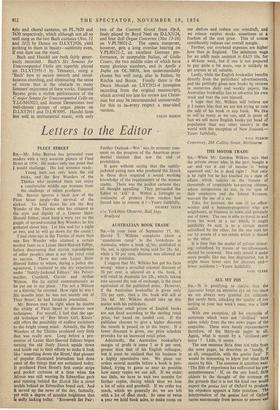AUSTRALIAN BOOK TRADE
SIR,—In your issue of September 17, Mr. Harold T. Wilkins complains about a ' scandalous ramp' in the bookshops in Australia, where a book of,jhis, published at 16s. net, is apparently being sold for 26s. 6d., while 'a 50 per cent. discount was allowed on it by the publisher.
I suggest that Mr. Wilkins has got his facts wrong': when a so-called colonial discount of 50 per cent. is allowed on a 16s. book, it will retail in Australia for 20s., which, taking into account the, rate of exchange, is the exact equivalent of the published price. However, if the Australian bookseller is given only 334- per cent., then a 16s. book will sell at 26s. 6d. Mr. Wilkins should take up this matter with his publishers.
Australian retail prices of English books are not fixed according to the sterling retail price, but based on landed cost. If the publisher chooses to give a higher discount the benefit is passed on to the buyer. If a lower discount is given, our price schedule provides for an increased retail price.
Admittedly, the Australian bookseller's margin of profit is some 7 or 8 per cent. greater than that of his English colleague,
but it must be realised that his business is a highly speculative one. We place our
orders several months before a book is pub- lished, trying to guess as near as possible how many copies we can sell. If we order
too little, we have to wait two months for further copies, during which time we lose a lot of sales and goodwill. If we order too much, which we generally do, we are left with a lot of dead stock. So once or twice a year we hold book sales, to make room on
our shelves and reduce our overdraft, and we release surplus stocks sometimes at ti fraction of the cost price. This of course considerably reduces our overall margin.
Further, our overhead expenses are higher here than in England. The minimum wage for an ad It male assistant is £A13 10s. for a 40-hour week, but if one is not prepared to pay quite a bit more, one is unlikely to get anyone at all suitable.
Lastly, while the English bookseller benefits directly from the publishers' advertisements, and the publicity given new books by reviews in numerous daily and weekly papers, the Australian bookseller has to advertise his own stock and bear the cost himself.
I hope that Mr. Wilkins will believe me if I assure him that we are not trying to ruin the sale of his book or any book. We like to sell as many as we can, and in point of fact we sell more English books per head of population than any other country in the world with the exception of New Zealand.— Yours faithfully,










































































 Previous page
Previous page